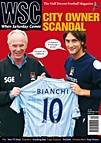 Just nine per cent of Premier League spectators are aged 24 or under. Sean Barnes asks whether the death of the football-going tradition among young people will mean a struggle to fill grounds in future
Just nine per cent of Premier League spectators are aged 24 or under. Sean Barnes asks whether the death of the football-going tradition among young people will mean a struggle to fill grounds in future
When football was invented by Rupert Murdoch in 1992, I was only five years old. Fast forward 15 years through the boom of English football – which we all know too well – and the story of my puberty – which, fortunately, no one knows at all – and here we are, footballers on seven-figure wages and English chairmen the exception to the rule of the modernised Premier League. Other well documented pitfalls include the increasing gap between club and supporter, the sanitisation of the match-day atmosphere and the decline of the working‑class fan. One problem that doesn’t get much attention, however, is my problem, and the problems of people like me. My generation may well be the last to appreciate fully the ups and downs of supporting a football club. The game needs to face up to its problem with the lack of English youth. And by that I don’t mean footballers, I mean fans.

